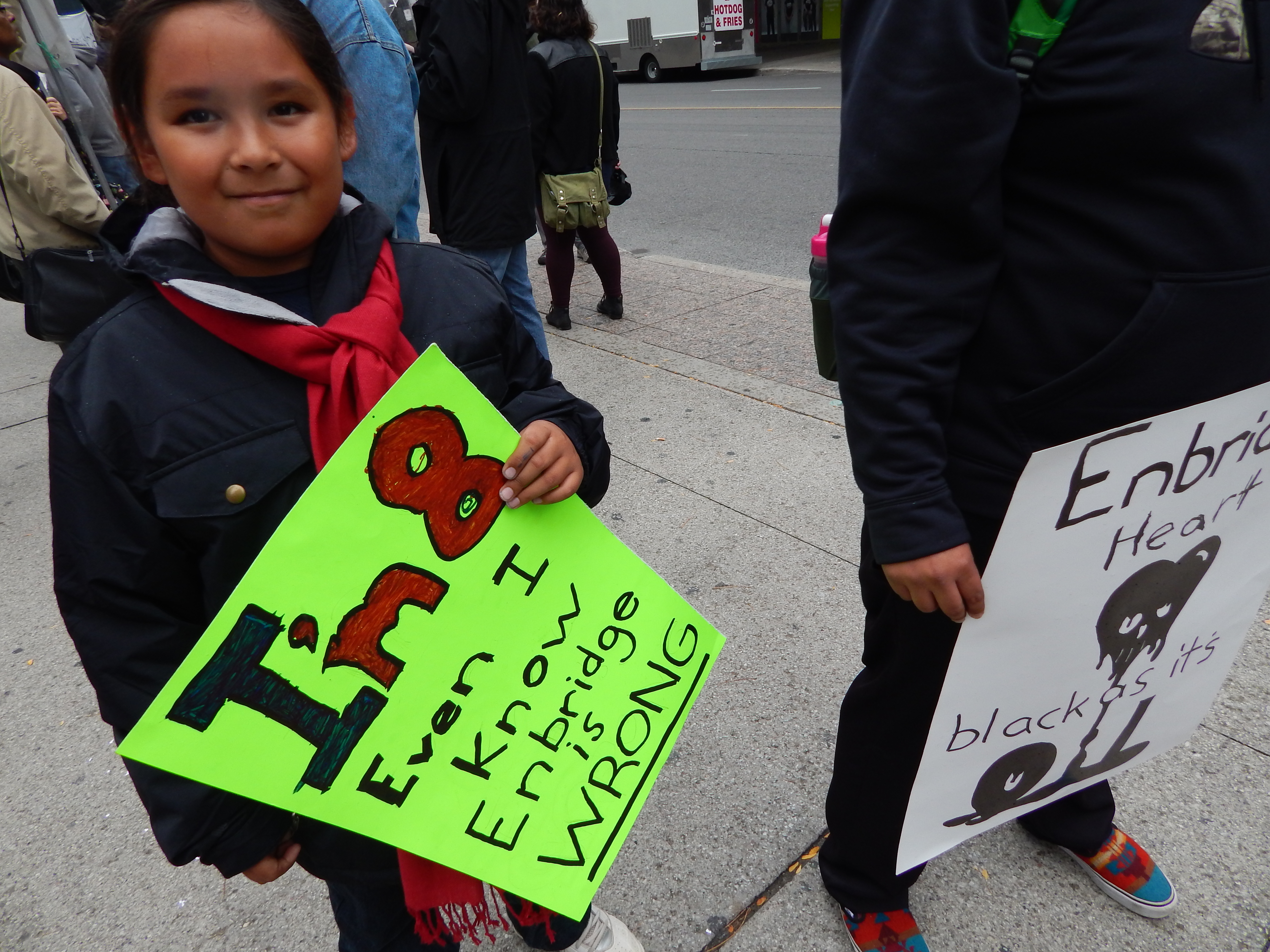No Line 9.
Protesters couldn’t have made their message any clearer at a rally outside the Metro Convention Centre on Saturday in Toronto.
“Let’s make this voice known across the nation,” said Crystal Sinclair, Idle No More Toronto.
“We need to wake up this country because I don’t think they really understand. They’re not getting the right message.”
Protesters made sure Canadians got the right message on Saturday. Despite the fact that the National Energy Board (NEB) cancelled the last day of the Line 9 hearings in Toronto due to “security concerns.”
Hearings to determine whether or not Enbridge will win approval of its plan to reverse Its Line 9 between Sarnia and Montreal, increase capacity to 300,000 barrels of crude oil per day – up from 240,000 barrels – and the right to use the pipeline to move a heavier form of crude from the Alberta Tar Sands.
“This is what we have to do,” said Sinclair. “It’s our obligation. Our responsibility.”
To ensure the land, water and air are spared further contamination.
“Not only have we done our research, we know the dangers of this project,” said Sakura Saunders, one of the rally organizers.
Such as putting the drinking water of millions of Canadians at risk in the event of an oil spill.
“We know its implications for upstream and downstream communities. We also know that the NEB process is a sham.”
The NEB approves most proposed power line or pipeline projects.
On Friday during the NEB hearings, after environmental activist Amanda Lickers made her deputation, protesters rose, cheered for her and then chanted. That was too much for the NEB, who said that show of solidarity “raised concerns” about the security of participants.
“By canceling these hearings, the NEB is just showing that they’re afraid of people coming together and affirming their truth, their dedication to protect the land,” said Saunders.
“Because we’re building a movement to oppose Line 9. And it doesn’t really matter what happens in those hearings.”
Protesters marched in the light rain from Simcoe Park, just across the street on the north side of the Convention Centre, to Roundhouse Park, across the street from the South Building.
The grassroots event drew close to 1,000 people, twice as many people as organizers were expecting for Saturday’s rally.
“Enbridge is afraid of us because we have the knowledge and the power,” said Vanessa Gray, Aamjinwang and Sarnia Against Pipelines.
“As indigenous peoples we have the rights to our land. As human beings we have the right to water and air. A right to feel protected from these companies. And we can’t rely on anyone but ourselves to do that.”
To combat the “environmental racism” that still exists today.
“The indigenous people have been through genocide after genocide and we are still here,” said Gray.
Reducing Enbridge to another enemy in a long history of adversaries. Making this fight another battle in a war that’s raged on for centuries against indigenous people.
A people who have seen their waters and land polluted and their livelihoods destroyed by the Tar Sands.
“The future is in our hands,” said Syed Hussan, community organizer. “We are here because we are part of one massive movement that refuses to sit silently by.”
Determined to stop Line 9.
“The Earth is our mother,” said Amanda Lickers, environmental activist. “We’ve got to take a stand and together protect these lands.”
Lands where Enbridge Line 9 runs through densely populated urban, rural and remote communities. A pipeline that runs through Nigel Barriffe’s north Etobicoke-Rexdale neighbourhood.
“It’s going to affect all sorts of people from different incomes,” said Barriffe, a teacher and community organizer.
“It’s right next to the Humber River.”
During the summer, Barriffe attended a Tar Sands Healing Walk where he saw the “blight of this kind of energy system” on the landscape.
“And we learned how First Nations have seen their land degraded and taken by the interests of capital and the state,” said Barriffe.
Earlier this week, “the Ontario Ministry of Energy told the NEB panel an independent third-party engineering assessment of Line 9 should be conducted before any approvals are granted.”
The Ontario government also demanded that the NEB ensure that “Enbridge secures at least $1 billion US in insurance coverage to foot the bill for cleanup should Line 9 suffer a major spill.”
Because Enbridge has a history of spills and leaks, not unlike other pipeline companies.
Before the United Steelworkers Toronto Area Council made their decision to oppose Line 9, they met with Stop Line 9 organizers about the implications of the Enbridge plan.
“We understood who the real enemy is here,” said Carolyn Egan, Steelworkers Toronto Area Council President.
“Because we are up against major corporations all the time. And we know that the corporations don’t have our interests at heart.”
Corporations that used to successfully pit labour unions against environmental activists.
“Once upon a time they said ‘if you want jobs then you can’t pay attention to the needs of the environment,’” said Egan.
“Well that’s an absolute lie and I think you all know it.”
Today, most labour unions and environmental activists work together for decent, green jobs.
“Jobs that do not harm our environment,” she said.
Since any harm done to the environment usually hurts the people who live in those affected communities.
“It’s not enough just to talk about the land and the water because we need people for the land as well,” said Krysta Williams, Native Youth Sexual Health Network.
“We don’t want to have young parents deciding whether or not to feed their children traditional food because they’re worried about the toxins in their fish. (Or) the toxins in their breast milk that come from mercury poisoning that companies like Enbridge don’t care about polluting.”
If approved, Enbridge said they hope to begin construction of the Line 9 Reversal and Capacity Construction Project some time during the first quarter of 2014.



